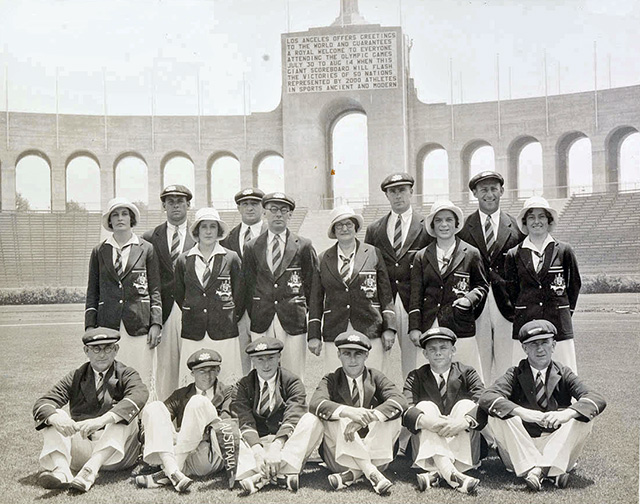Australia's remarkable success at the Olympic Games has been a topic of admiration and curiosity worldwide. Despite its relatively small population, Australia consistently ranks among the top nations in terms of medal counts.
This success can be attributed to a combination of historical dedication to sports, robust investment in athlete development, a supportive sports culture, and a competitive spirit. As Australia looks to future Olympic Games, its legacy of excellence is likely to continue, inspiring new generations of athletes to reach for the stars.
 Australian team at the 1932 LA Olympic Games
Australian team at the 1932 LA Olympic GamesAustralia’s strong sports culture, characterized by widespread community support and a national emphasis on physical fitness and competition, contributes significantly to its Olympic success. This culture fosters a conducive environment for the development of world-class athletes.
Australia’s success is also partly due to substantial investment in sports infrastructure and athlete development. The Australian Institute of Sport (AIS), established in response to a disappointing performance at the 1976 Montreal Olympics, has been pivotal in nurturing elite athletes and maintaining Australia's competitive edge.
Punching Above Its Weight
When comparing Australia’s Olympic success to other nations, it is impressive how a country with a population of around 26 million can consistently compete with and often outperform much larger countries.
While nations like the United States, China, and Russia have larger populations and often lead the medal counts, Australia’s performance is notable for its consistency and excellence across multiple sports.
Australia’s medal efficiency, which measures the number of medals won per capita, is remarkably high. In the Tokyo 2020 Olympics, Australia ranked sixth in the overall medal tally with 46 medals, despite having a much smaller population than the leading countries like the United States and China.
Dominant Sports in Australia
Australia has established a strong reputation in a variety of sports, particularly in swimming, cycling, rowing, and field hockey. These sports have been the bedrock of Australia’s Olympic success, contributing significantly to the country’s medal tally.
Swimming is arguably Australia's most successful Olympic sport. The nation has produced a series of swimming legends, such as Ian Thorpe, who won five Olympic gold medals, and Dawn Fraser, a three-time Olympic champion in the 100-meter freestyle. Australia’s swimming program has consistently churned out world-class athletes who dominate the pool at every Olympics.
Cycling is another area where Australia has excelled. The country has a strong tradition in track cycling, with athletes like Anna Meares, who won gold in the women's sprint at the 2004 Athens Olympics and the 2012 London Olympics, becoming household names. Australia’s success extends to road cycling as well, with Cadel Evans’ Tour de France victory underscoring the depth of talent.
Australia has a rich history in rowing, with numerous medals won across different Olympic Games. The “Oarsome Foursome,” a coxless four rowing team, became national heroes after winning gold at the 1992 and 1996 Olympics. The tradition of rowing excellence continues, with Australia regularly featuring on the podium.
Field hockey is another sport where Australia has made its mark. The men’s team, known as the Kookaburras, has been consistently strong, winning gold at the 2004 Athens Olympics. The women’s team, the Hockeyroos, has also been dominant, securing gold medals at the 1988 Seoul and 2000 Sydney Olympics.
Outstanding Athletes
Australia's success at the Olympics can be attributed to a plethora of extraordinary athletes who have become symbols of excellence and perseverance.
- Ian Thorpe: Ian Thorpe, known as "The Thorpedo," is one of Australia’s most celebrated swimmers. With a total of five Olympic gold medals and numerous world records, Thorpe's achievements in the 2000 Sydney and 2004 Athens Olympics have made him a swimming legend.
- Cathy Freeman: Cathy Freeman’s victory in the 400m at the Sydney 2000 Olympics is one of the most iconic moments in Olympic history. Her win not only marked a personal triumph but also held significant cultural importance, symbolizing reconciliation and pride for Australia’s Indigenous community.
- Anna Meares: Anna Meares, a track cyclist, is another example of Australian sporting excellence. She has won six Olympic medals across four Games, including gold in the women’s sprint at the 2004 and 2012 Olympics, and is considered one of the greatest female cyclists of all time.


 Current Events
Current Events